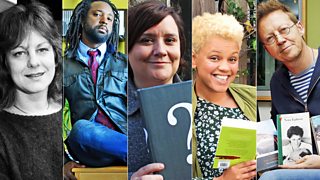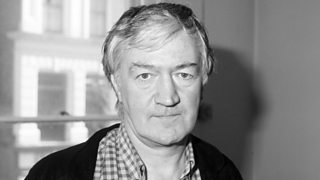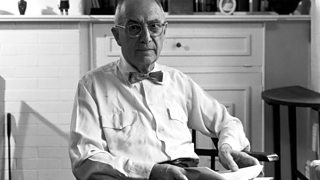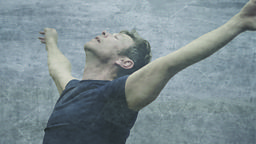Main content
Enchanted by language: Hull 18 poets reveal their trade secrets
28 September 2018
As the Contains Strong Language festival gets underway, we turned to four of the for poetic inspiration. Favourite lines, the key to creating a memorable poem, and advice for aspiring wordsmiths - hear what the insiders have to say about their craft.


What makes a memorable poem?

Louise Wallwein MBE
- An arresting image that transports you into the world of the poem.
- A truth that you can't escape from, either personal or a more global truth.
- Playful language, made up words and wordsmithery.
- Landscape, either an internal voice or some vast external landscape that has made the poet stop in their tracks and take notice.
- Rhythms, loads of rhythms.
The Night Train by WH Auden has the rhythm of a train journey. As a poet you can transport your reader or audience straight to an experience through your choice of rhythm.


Vladimir Lucien
- An arresting metaphor. It's how we can begin to think of the lost wholeness of the world/universe, by the often disparate things it brings together in ways or places where you've never seen it before.
-
I like poems that make me feel like I am alone in a small, but comfortable, room. I don't know how else to put it. It's a strongly visceral reaction to poems that is very important to me.
-
I have a penchant for old, dead phrases made new. And I like poems that end subtly, where the poet isn't too deliberate or heavy-handed about how the poems end. I just love the ending of the title poem from Seamus Heaney's Human Chain:
Nothing surpassed
That quick unburdening backbreaker's truest payback,
A letting go which will not come again.
Or it will, once. And for all.

Poetry makes me feel like I am alone in a small, but comfortable, room. It's a visceral reaction.

Ishion Hutchison
- None but words. Words set in motion.
This movement of words is an action of lifting the vertical truth from the horizontal flatness of language. That effort to come upright, in lines, is extreme and difficult but it must be done - for the poem to be a poem.


Amanda Dalton
- Its ability to make something you thought you knew feel like a brand new, amazing discovery.
- The poet has understood that less is usually more.
- It could only have been a poem. The words have found their form.
- That it contains felt experience - however restrained or coded. I can feel controlled human emotion in the poem.
- The magic ingredient. It’s impossible to quantify or name.


How to make your poetry sing

Louise Wallwein MBE
- Go to workshops run by other poets - we are always learning.
- Read your work out loud.
- Read other poets work out loud. I don't like the division of page and stage poetry, it's another false border to me.
- Challenge yourself. I was terrified for years, so I challenged myself to go the library and find out what everyone was going on about
- Write everyday with pen and ink, even if its just a shopping list. I love computers but writing can be a sensuous act.
- Forget about what you think a poem should be or what it should contain. What matters is writing your truth.
- Don't hold on to your heroes too long. It's more than OK to hero-worship poets and even to mimic their style. But everyone has a unique voice.
Forget about what you think a poem should be or what it should contain. What matters is writing your truth.

Vladimir Lucien
- Read way more than you write.
- Be disciplined about writing. Try writing for a certain amount of time each day.
- Be brutal with yourself. Your aim is to have a good line each time, not to have its badness go unnoticed.
- Don't hasten toward the grandiose - develop the poem slowly.
- Conduct an in-depth study of a poet you adore. This isn't an arbitrary exercise. It teaches devotion, which will be good for your writing and your life.
- Poetry is a mixture of audacity and restraint. Find the balance.
Conduct an in-depth study of a poet you adore - this teaches devotion, which will be good for your writing and your life.

Poetry can鈥檛 be improved, the same way the ocean can鈥檛 be improved.
Ishion Hutchison
- Poetry can’t be improved, the same way the ocean can’t be improved.
The hope is for some kind of reciprocity, to be touched by it and be healed, if at least momentarily. I love libraries and find them a great place to hack out one’s personal anthology.


Read... Read some more.
Amanda Dalton
- Read.
- Read as a writer.
- Read without prejudice.
- Read as an explorer.
- Read with immense curiosity.
- Read what’s being written now.
- Read some more.


Favourite lines


Poetry is a beautiful mud-pie, washed down by a glassfull of stars.
Louise Wallwein MBE
- "Poetry is a beautiful mud-pie, washed down by a glassfull of stars"
by .
I think he came up with the best answer to the question, what is poetry? I read it out to people in workshops and get them to perform it.
Louise's CSL Highlights
- I'm really looking forward to the 大象传媒 Writersroom discussion with Amanda Dalton, a poet I admire greatly.
- I'm over the moon with my commission for Absolutely Cultured. I've written a street poem that will take place in hidden and forgotten alleyways around Hull. There is a community cast and stellar Poets Russ Listen, Zena Edwards and the outstanding Women of Words Collective.
- I'm well chuffed I'm going to be on The Verb with Joe Hakim, Jackie Kay and Gruff Rhys.
- I'm excited about lots of things, from Shirley May launching her long anticipated book to films by Jackie Kay, and getting to know poets from around the world.

This is one of the most difficult and perhaps impossible questions to ask a poet.
Vladimir Lucien
- This is one of the most difficult and perhaps impossible questions to ask a poet. I'll go with Jamaican poet Tony McNeill's:
"Love is Earth's mission
Despite the massed dead."
Not the most dulcet lines rhythmically, but I love the idea.
Vladimir's CSL Highlights
- I'm excited. It has been a largely silent and solitary journey for me and I want to hear the poems reverb.
- I also have a great love for reciting poetry. It gives me a rush, and I am looking forward to having that feeling again.
- I'm eagerly anticipating hearing the tapestry of voices. And it will be great to hear those Caribbean voices in England now, don't you think?
- I am excited about being not too far from where Philip Larkin lived and walked... at least, at some point in time.

Ishion Hutchison
- These days I keep the last line of Milton’s On His Blindness in my head:
“They also serve who only stand and wait.”
There’s a balance of force here that strikes at the roots of justice and equity. Where else is “also” used so judiciously, so lovingly? I think of Milton’s “also” in the same way as the “too” of the first line of Robert Hayden’s Those Winter Sundays:
“Sundays too my father got up early.”
It is not merely incidental that both the Milton and Hayden poems are both sonnets. To me it means a unity in the struggle to make something true, language charged to reach further than their individual and immediate speaking moments - four hundred years between them - and has put them directly in dialogue.
To me it means a unity in the struggle to make something true, four hundred years between Milton and Hayden, and has put them directly in dialogue.


There are no ideas but in things.William Carlos Williams
Amanda Dalton
- Impossible to answer. It changes every day.
Instead, I’ll give you a well known quote I often return to when I’m teaching.
Amanda's CSL Highlights
- I’m very excited to be appearing with Sophia Jansson. Her aunt Tove Jansson is one of my all-time favourite writers. It was a thrill to have Sophia as narrator in my recent dramatisation of The Summer Book and I’m delighted to be sharing a stage with her at CSL.
- I’m currently working with Karen McCarthy Woolf on a radio dramatisation of Virginia Woolf’s Orlando. It’ll be wonderful to read poetry on stage with her.





